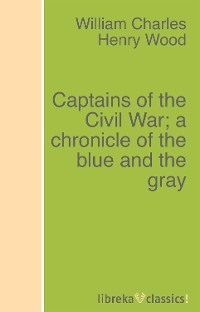
Captains of the Civil War; a chronicle of the blue and the gray
Meanwhile, before McClellan went to Washington and Lee to West Virginia, the main Union army had been disastrously defeated by the main Confederate army at Bull Run, on that vital ground which lay between the rival capitals.
In April Lincoln had called for three-month volunteers. In May the term of service for new enlistments was three years. In June the military chiefs at Washington were vainly doing all that military men could do to make something like the beginnings of an army out of the conglomerating mass. Winfield Scott, the veteran General-in-Chief, rightly revered by the whole service as a most experienced, farsighted, and practical man, was ably assisted by W. T. Sherman and Irvin McDowell. But civilian interference ruined all. Even Lincoln had not yet learned the quintessential difference between that civil control by which the fighting services are so rightly made the real servants of the whole people and that civilian interference which is very much the same as if a landlubber owning a ship should grab the wheel repeatedly in the middle of a storm. Simon Cameron, Page 34 then Secretary of War, was good enough as a party politician, but all thumbs when fumbling with the armies in the field. The other members of the Cabinet had war nostrums of their own; and every politician with a pull did what he could to use it. Behind all these surged a clamorous press and an excited people, both patriotic and well meaning; but both wholly ignorant of war, and therefore generating a public opinion that forced the not unwilling Government to order an armed mob "on to Richmond" before it had the slightest chance of learning how to be an army.
The Congress that met on the Fourth of July voted five hundred thousand men and two hundred and fifty million dollars. This showed that the greatness of the war was beginning to be seen. But the men, the money, and the Glorious Fourth were so blurred together in the public mind that the distinction between a vote in Congress and its effect upon some future battlefield was never realized. The result was a new access of zeal for driving McDowell "on to Richmond." Making the best of a bad business, Scott had already begun his preparations for the premature advance.
By the end of May Confederate pickets had been in sight of Washington, while McDowell, crossing Page 35 the Potomac, was faced by his friend of old West Point and Mexican days, General Beauregard, fresh from the capture of Fort Sumter. By the beginning of July General Patterson, a veteran of "1812" and Mexico, was in command up the Potomac near Harper's Ferry. He was opposed by "Joe" Johnston, who had taken over that Confederate command from "Stonewall" Jackson. Down the Potomac and Chesapeake Bay there was nothing to oppose the Union navy. General Benjamin Butler, threatening Richmond in flank, along the lower Chesapeake, was watched by the Confederates Huger and Magruder. Meanwhile, as we have seen already, the West Virginian campaign was in full swing, with superior Federal forces under McClellan.
Thus the general situation in July was that the whole of northeastern Virginia was faced by a semicircle of superior forces which began at the Kanawha River, ran northeast to Grafton, then northeast to Cumberland, then along the Potomac to Chesapeake Bay and on to Fortress Monroe. From the Kanawha to Grafton there were only roads. From Grafton to Cumberland there was rail as well. From Cumberland to Washington there were road, rail, river, and canal. From Washington to Page 36 Fortress Monroe there was water fit for any fleet. The Union armies along this semicircle were not only twice as numerous as the Confederates facing them but they were backed by a sea-power, both naval and mercantile, which the Confederates could not begin to challenge, much less overcome. Lee was the military adviser to the Confederate Government at Richmond as Scott then was to the Union Government at Washington.
Вы ознакомились с фрагментом книги.
Для бесплатного чтения открыта только часть текста.
Приобретайте полный текст книги у нашего партнера:
Всего 10 форматов